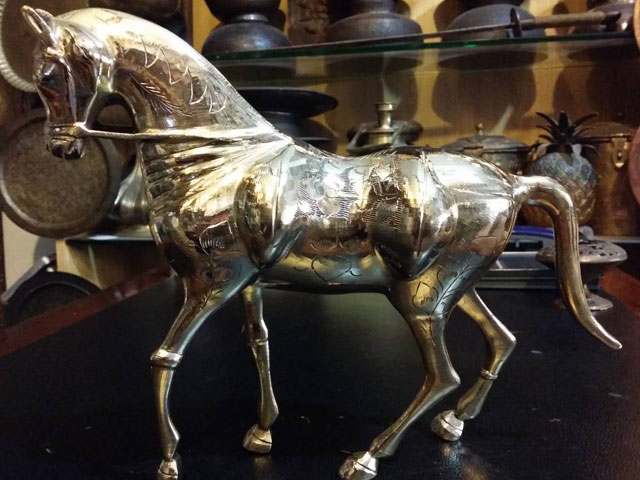
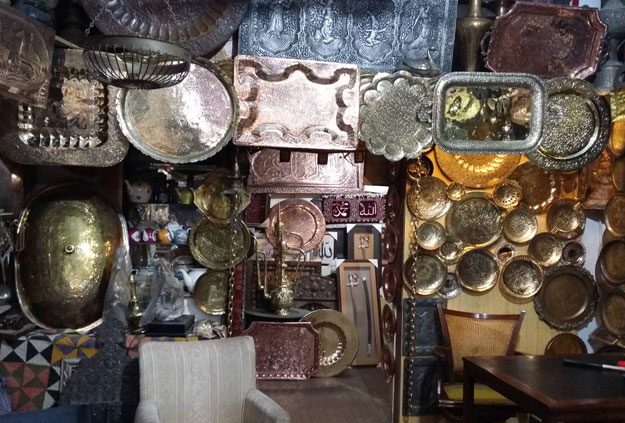 PHOTO: ABDUR RAZZAQ
PHOTO: ABDUR RAZZAQAlmost 90 per cent of the Afghan refugees who used to deal in antiques and handicrafts in the city have shut their shops ever since their repatriation began. The ongoing militancy in K-P, Federally Administrated Tribal Areas (FATA) and the bordering Afghanistan has also left dark shadows over the historical trade.
The entire situation is different now. The famous Shinwari Market in the Undhar Shehar Bazaar is known for its valuable antique pieces not only in Pakistan but also in Afghanistan and Iran. Not very long ago, most of the Afghan refugees were concentrated in the famed Qissa Khawani Bazaar with 20 shops, which meant lots of buying and selling. However, the number of businessmen has now dropped to four or five who are still continuing the business.
With Afghan refugees leaving, is Pakistan waving goodbye to carpet-weaving?
In Peshawar’s Saddar Bazaar, 10 antiques and handicrafts shops belonged to a single Afghan family, however, unfortunately, now only one seller is left to do the decade-old trade.
Pakistan is home to the world’s second-largest refugee population, with some 2.5 million Afghans living here. Many have been in the country since the Soviet invasion. In the 1980s, when Russia invaded major cities of Afghanistan, most of the Afghans migrated to Peshawar and established their businesses. The antiquities business, however, became the most preferred trade of the city.
“The business is almost gone from the city while the merchants who are still doing the business, are also planning to return to Afghanistan, fearing a possible crackdown by the authorities,” says Anwar Ali, a local resident.
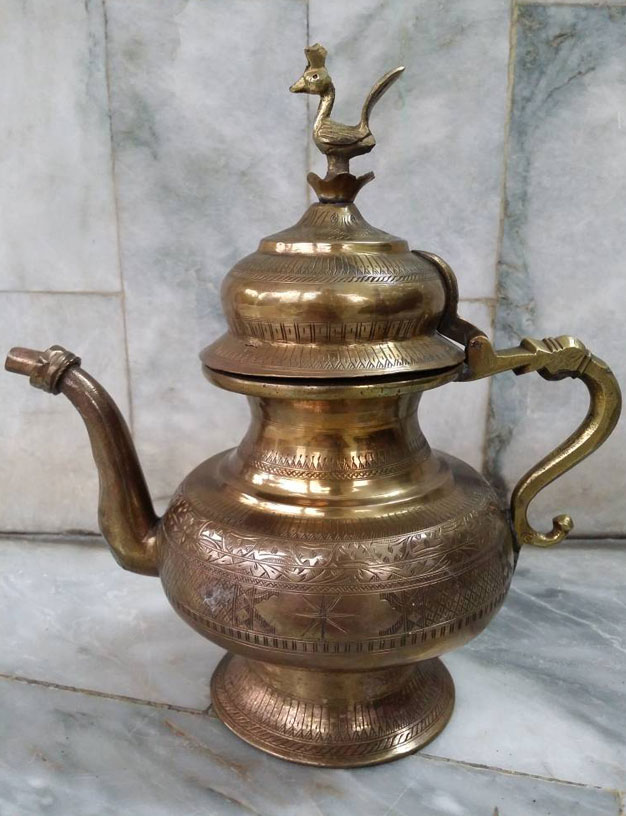 PHOTO: ABDUR RAZZAQ
PHOTO: ABDUR RAZZAQIn the wake of the 2014 attack on Army Public School (APS) in Peshawar, strict border controls and a crackdown on illegals Afghans forced several Afghan refugees, including businessmen, to move back to their country. One of the 20 points of the National Action Plan (NAP) – a national policy devised after the APS attack to fight terrorism – deals with a comprehensive policy for registration of Afghan refugees in the country.
Hailing from Kabul in Afghanistan, Muhammad Wali says a large number of Afghans had invested their money in the antiques trade but a new deep slump in the market is forcing the remaining of them to shut their shops.
Fostering skills: Arts and crafts exhibition kicks off
Some of Wali’s friends and family members had already migrated to their war-torn country.
“There used to more than 100 shops owned and successfully run by Afghan traders on the first floor of the Shinwari Market. Only a few are now left,” says Wali, who also believes that the business flourished more in Afghanistan as compared to Pakistan because foreigners frequently paid more visits there.
“About 75 per cent of the people [in Peshawar] associated with the antiques business are Afghans. Despite this, with the deadline to leave Pakistan approaching, it is essential that they take their businesses back to Afghanistan,” says Ahmad Noorani, another Afghan trader.
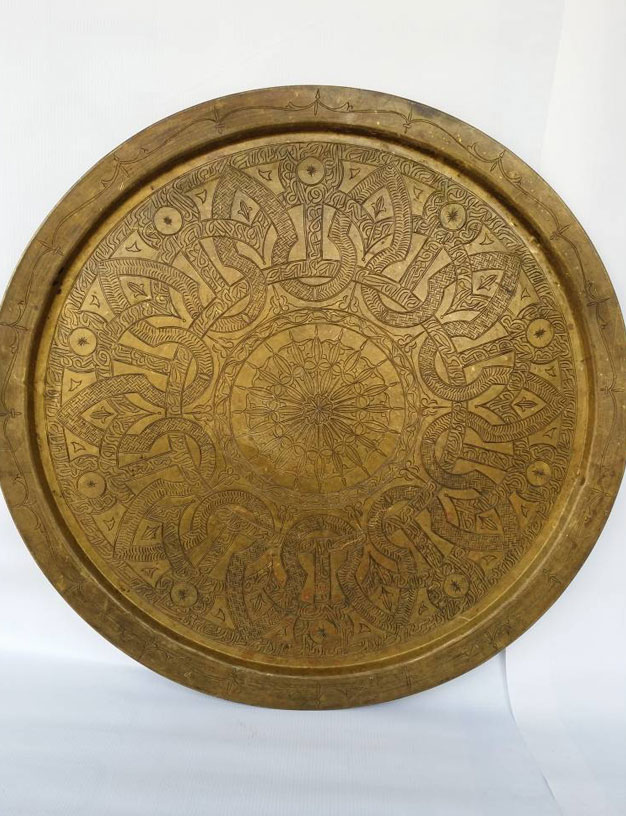 PHOTO: ABDUR RAZZAQ
PHOTO: ABDUR RAZZAQAfghan refugees first landed in Pakistan in the early 1980s after the Russian intervention in Afghanistan. Nevertheless, even after the Russian pullout from the country, Afghanistan remained unstable that forced many Afghans to continue their lives in Pakistan as refugees. The influx and repatriation of refugees from Pakistan continued throughout these years.
“Two decades ago, visitors from the western world used to stay in the capital of K-P. They liked the antiques and historical handicrafts and so they used to purchase them in large quantity. Later militancy and growing unrest in the region repelled the visitors from Peshawar while the local community does not take much interest in the trade”, complains Jamshid Baig, a local in Peshawar.
China Accelerator to help promising K-P startups increase outreach
“My ancestors started the business in 1967,” continues Baig, adding that even now five or six local visitors came to his antiques shop daily still a few take interests in purchasing the collectables.
“In the last two years, not a single foreigner visited my shop.”
Such is the toll of militancy, region’s uncertainty and Afghan refugees’ repatriation that has taken on the trade of antiquities and handicrafts in K-P.
Baig once owned a treasure of 100 to 150-year-old antiques, handicrafts and embroidered dresses (local and international). Most of them were imported from Afghanistan, Iran and India. Some of his other pickings included pieces of jewellery, famous Afghan carpets and varying tools such as swords, iron helmets, statues, warfare.
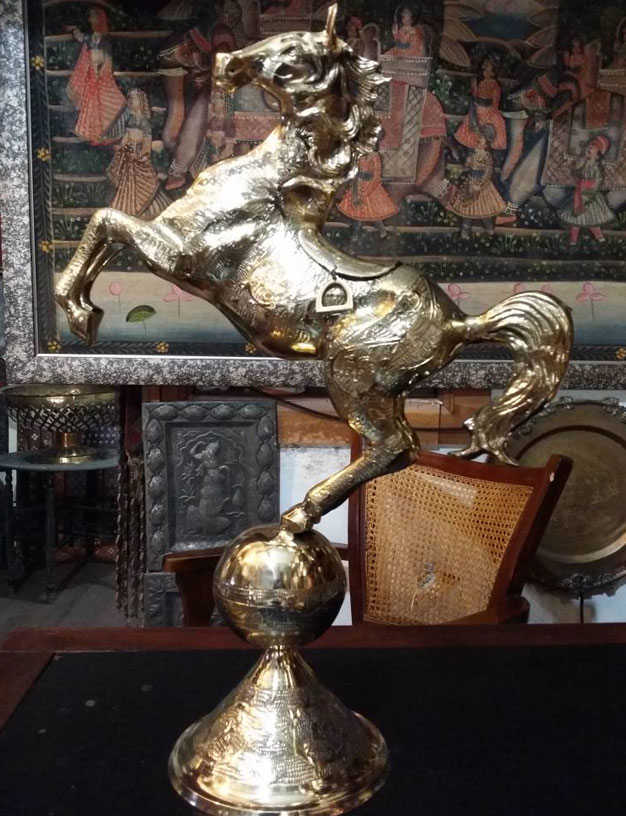 PHOTO: ABDUR RAZZAQ
PHOTO: ABDUR RAZZAQ“Peshawar was a centre for producing metal wares, artificial jewellery, handicrafts and other antiques. Local blacksmiths and other skilled persons were associated with the business but, unfortunately, terrorism ruined their means of earnings. Many of them adopted other trades,” explains Baig.
“During the Afghan war, carpets, antiques including jewellery made of brass and copper were brought by Afghan migrants to Peshawar”, he says while mentioning that the post-APS attack measures by the Pakistani government greatly put a damper on the import activities from Afghanistan and Iran.
K-P information directorate restored
In its heyday, Baig’s business helped him make a healthy profit of 40 to 50 per cent in a month. Then he saw that the very rate narrowed down to somewhere near, 10 per cent only.
Military operations in the tribal regions were primarily aimed at wiping out militant bases. For locals, however, militancy, target killings and the plight of the Afghan refugees badly disrupted the businesses. Others also blame the inoperativeness of the provincial government in bringing about a change by introducing new opportunities.
“The K-P government is also responsible for the decline in our business. It did not organise special events regarding antiques and handicrafts business where we could display our products,” criticises Munir Butt, another resident of Peshawar.
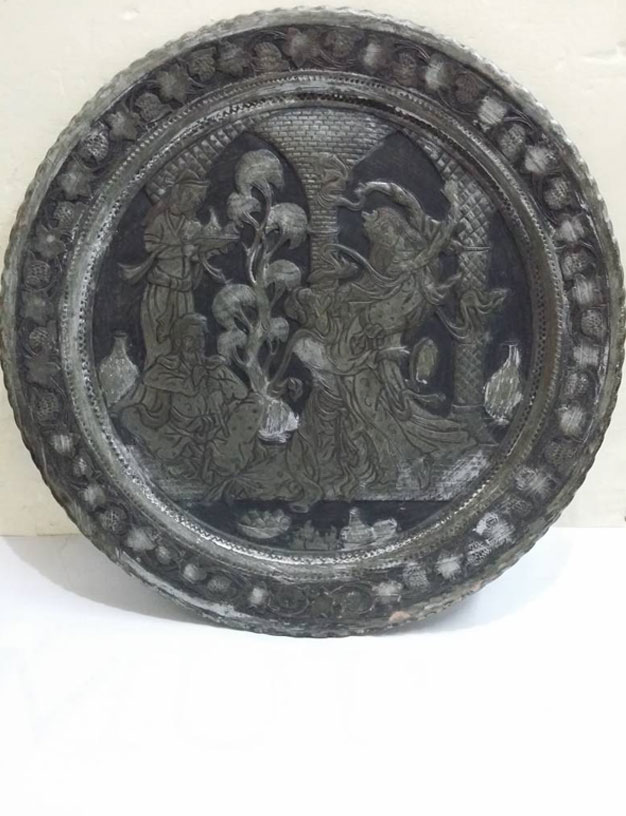 PHOTO: ABDUR RAZZAQ
PHOTO: ABDUR RAZZAQButt recalls the time when regular art exhibitions, organised by the federal government, were common in K-P where he used to participate actively.
“Ours is a culturally rich province. The provincial [K-P] government must do something for the revival of the business in its major cities,” at the earliest.
“Volatile situation in the region had an adverse impact on the overall business activities in K-P. Also due to the closure of Pak-Afghan Torkham border, the trade of antiques and handicrafts fell into a decline,” according to Haji Muhammad Afzal, President K-P Chamber of Commerce and Industries (KPCCI).
A K-P state of mind: Art has not left the building
He maintains, “a few months back, an exhibition was organised by the KPCCI in Islamabad where businessmen, dealing in antiques, were invited. In the near future, another event will be held in Peshawar for the promotion and revival of antiques and handicrafts business. We hope such events will give a boost to the business.”
With not many foreigners as tourists now visiting the terror-hit city, a constant fear of more terror-linked incidents and a rising inflation in the country, Peshawar’s business model may be under a threat. Yet, the business of antiques and handicrafts must not die. All eyes are certainly on the K-P government for the much-needed revival.
Abdur Razzaq is a Peshawar-based radio and print journalist. He tweets @TheAbdurRazzaq











COMMENTS (1)
Comments are moderated and generally will be posted if they are on-topic and not abusive.
For more information, please see our Comments FAQ